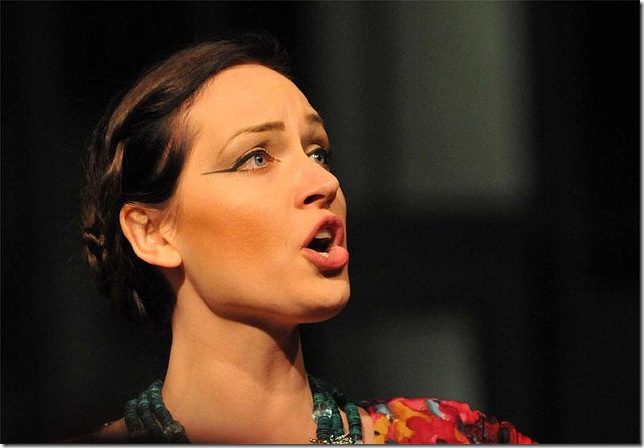The Palm Beach Opera’s Young Artists troupe wrapped its One Opera in One Hour season Friday night with an abridged version of Mexican composer Daniel Catán’s Florencia en el Amazonas.
And it showed that this is an opera that really should be on the mainstage here.
That’s not because Catán’s score is a great one: Even cut to an hour, it never goes anywhere. It just sits and noodles prettily in late Puccini-Debussy territory, without a really good melody in sight to make it satisfying. It’s saved in its full version by its first-rate orchestration, which provides lovely colors and aural lushness.
But that weakness is outweighed by the immediate audience buy-in it offers as a tonal, musically unthreatening work of modern opera, and its effectiveness as an evening of theater, which was clear even from a piano-only workshop version of the piece. The decent-sized house at the Harriet Himmel Theater in CityPlace appeared to adore it, and that says important things about its potential to draw good crowds to the Kravis Center.
The American soprano Alexandra Rafalo was Florencia, and as she did in the series’ earlier production of Handel’s Semele, she showed off a voice that has a dark, smoky quality, and one of considerable power. It is also a voice that could use some polishing at the edges; in climactic passages, she tended to cut off her terminal notes abruptly, and she was under pitch on a couple of the higher notes.
But she sang very well overall, and she made a striking Florencia, in part because she is a beautiful woman, but more importantly because she was believable as a person who understands the power of love and is able to impart hard-earned wisdom about it. When it was time for her to hold the stage, she held it firmly, vocally and dramatically.
The other women in the cast, Canadians Emily Duncan-Brown and Shirin Eskandani, also were excellent. Soprano Duncan-Brown has been the heroine of this series with her fine lead performances in Semele and Copland’s A Tender Land. In Florencia, as the writer Rosalba, she reminded us why: An agile, well-trained, pretty voice with roundness, warmth and strength, and considerable stage chops as an actress. Her Rosalba was endearing and magnetic, and expertly sung.
As Paula, Eskandani gave one of the sharpest performances I’ve yet seen from her. As one half of a warring couple, she was able to make her fine mezzo coordinate perfectly with the “nagging” appoggiaturas in the piano, and her voice had a hardness that illuminated the character’s state of mind. That hardness was gone after Paula’s apparent loss of her husband Alvaro, and the tenderness with which she sang after that was clear and gratifying.
The men were just as good, especially Kenneth Stavert as Alvaro. His voice has darkened and become more forceful since his last go-round in 2010-11 as a Young Artist, and here he made a fine co-combatant with Eskandani. Mexican tenor Evanivaldo Correa was likeable and slightly caddish as Arcadio, and his voice sounded less strained than it has on other occasions. All four of the singers – Eskandani, Stavert, Duncan-Brown and Correa – were particularly engaging in the card game scene, which has Catán’s most interesting music.
Bass Benjamin Clements was a very good Captain, and his voice, just as it did in Tender Land as Grandpa Moss, demonstrated a pleasant, lovely quality that works well in small spaces. Guest artist Daniel Snodgrass, filling in on short notice for a missing Young Artist, was a fine Riolobo, with a light, flexible baritone and an engaging stage manner that helped him move the action along.
Musical director Sergio Puig clearly coached his cast well, and his piano playing was able and accurate. Stage director Andrew Nienaber, who said in program notes that this is his favorite opera, added to the minimalist look of the production with simple but useful lighting effects at dramatic high points, and the use of three teenage girls as supernumeraries who represented the Amazon itself and who helped arrange the final butterfly (they were Victoria Devereaux, Jenna Palmeri and Phoebe Wiener, and they did fine).
The One Opera in One Hour shows, instituted by artistic director Bruno Aprea, have been a smart addition to the Palm Beach Opera’s activities, and a good example of the kind of wider community involvement the company wants to pursue in the seasons ahead. Next year’s plan calls for a complete staged production for the Young Artists of Benjamin Britten’s The Turn of the Screw, in collaboration with the Lynn University conservatory.
But one trusts that these little operatic evenings in the heart of the city will continue, too. They are too valuable as training opportunities and fresh theatrical experiences for audiences to do otherwise.
